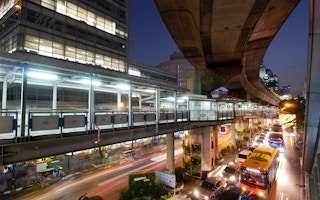Transport is a key ingredient of inclusive economic development, poverty reduction, and to improving quality of life. It provides people with access to jobs, schools, and health care; links farms to markets; and drives trade.
ADB has been financing transport investments in its developing member countries for over four decades. In 2014, transport accounted for 28 per cent of total ADB operations, with $3.8 billion of loans and grants approved for 28 new transport investment projects, and $23.5 million for 31 technical assistance projects.
But this is not enough.
Countries in the Asia Pacific region have enormous transport investment needs – $2.5 trillion in the decade up to 2020. Many people in low-income countries still lack access to basic transport services, while middle-income countries face transport capacity bottlenecks that limit inclusive economic growth, and rapidly growing cities require transportation networks to serve their populations.
Increased motorization is imposing heavy costs through congestion and air pollution. In Bangkok, for instance, the cost of traffic congestion is about 6 per cent of GDP. And let’s not forget that road crashes cost ADB’s developing member countries $96 billion annually. Road crashes are the leading cause of death for Asians between 15 and 44 years old, the most productive segment of society. Transport also weighs heavily on climate change, producing almost one-quarter of global greenhouse gas emissions. One fifth of transport emissions are from developing Asia and these are rising fast.
“
Transport also weighs heavily on climate change, producing almost one-quarter of global greenhouse gas emissions. One fifth of transport emissions are from developing Asia and these are rising fast.
In 2010, recognizing these huge barriers to inclusive growth and poverty alleviation, ADB established the Sustainable Transport Initiative Operational Plan. This is a guiding document that sets strategic directions to mainstream sustainability in ADB transport operations until 2020.
Five years later, we have made some progress on promoting sustainable transport by financing investments, policy changes and capacity development to help countries make their transport systems accessible, affordable, environmentally friendly, and safe.
Still, and given the institutional commitment for a stronger, better and faster ADB, we in the Transport Sector Group are aiming to further strengthen, innovate and scale up our transport operations in the region. To start, we will conduct a midterm review of the 2010-2020 operational plan to determine which adjustments are needed to meet the targets. So far, the focus is on increasing the share of lending for urban transport and railway projects, expanding road safety support, and being more selective in support for road construction.
With the overall goal of scaling up sustainable transport by up to 50 per cent of loans and grants by 2017, ADB plans to work closely with developing member countries to expand the pipelines of sustainable transport projects included in countries’ investment plans. ADB will also tap experts to help formulate innovative projects in line with the targets of the operational plan. For example, we partnered with the Institute of Transportation and Development Policy, an international center of excellence on bus rapid transit (BRT) systems, to design and implement ADB’s first BRT project in Lanzhou, People’s Republic of China. We intend to do more of this collaborative work in the future to increase sustainability in transport through multimodal rail hubs, climate-proofed ports, safer roads, etc.
The time is ripe for change. Asia needs innovative solutions for sustainable transport, and ADB wants to be a part of that by strengthening the way we incorporate the latest knowledge and best practices in our transport operations, and expanding the sustainable transport lending pipeline. 2015 marks the beginning of a coordinated effort to bring all of this about.
Tyrrell Duncan is Technical Advisor (Transport), Sustainable Development and Climate Change Department, Asian Development Bank. This post is republished from the ADB Blog.











